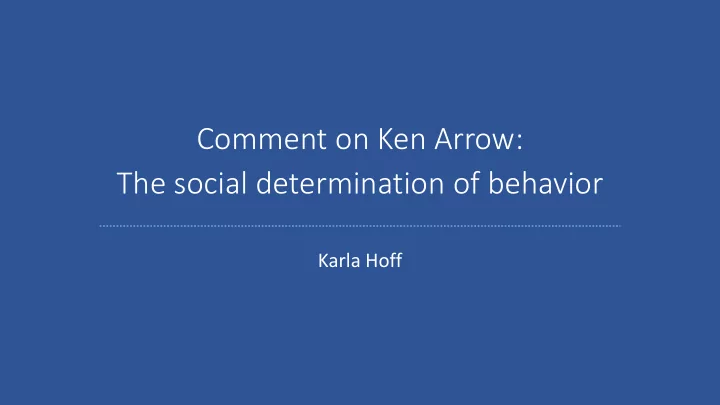

Comment on Ken Arrow: The social determination of behavior Karla Hoff
The standard model assumes a rational actor Stable & autonomous preferences
Market Autonomous people
Under some conditions: Perfect competition No missing markets No asymmetric information
The Fundamental Theorems of Welfare Economics The 1 st st theo Th heorem em The competitive economy is always Pareto efficient. The 2 nd theo Th heorem em Every Pareto efficient allocation is a competitive equilibrium for some distribution of purchasing power. Arrow 1951
The assumptions in economics about how individuals make decisions have become contested
-- Kahneman 2011
Thinking fast & neglect of ambiguity Kahneman 2011
1990s—Psychology departs from universals in cognition The human mind is a pattern-matching machine Categories and other mental models help us process information and sort the world into easer-to-read patterns Definition of culture: the set of mental models that we use to process information: They shape attention, construal, memory, & emotion responses They include inconsistent representations.
Example from Brazil: Soap operas of societies with low fertility • A company deliberately crafted soap operas with characters who had few or no children • The fertility decline in a municipality began after the first year the municipality had gained access to the TV soap operas. • The decline was greatest for respondents close in age to the leading female character • For women of age 35–44, the decrease was 11% of mean fertility. • Causal identification: based on the arguably random timing when different parts of Brazil obtained access to the TV emissions La Ferrara et al. 2012
Jensen (2012) hired 8 call center recruiters and sent them to 80 villages
Randomized controlled trial in 160 villages in India • One day per year, for 3 years, one information session was held • 3 years of continuous placement support to women, by phone • 11 job matches on average per village over 3 years • Proportion of young women with call center jobs increased from 0 to 5.6 points
Social impact on women of age 15-21 Markets with call center recruiters in the village • Proportion married drops (71% control, 66% treatment) • Proportion with children drops (from 43% to 37%) Recruiter Sellers
Social impact on women of age 15-21 & on girls Markets with call center recruiters in the village • Proportion married drops (71% control, 66% treatment • Proportion with children drops (from 43% to 37%) • BMI of girls The treatment closed 30% of the gap between village girls and the wealthiest Recruiter Sellers residents in Delhi
Social rigidity Because social experience shapes stereotypes, prototypes, and other mental models, society can be rigid.
Example: 2 mental models of parents’ utilty gains from educating a daughter, V P & V A . Hoff and Stiglitz 2016
Distribution of benefits to parents from an uneducated daughter • .
• . .
Market outcomes can affect who we are. Markets shape how we think—they have a “schematizing role”
Stan andar ard E Econ onom omics The rational act Th ctor or Guided by Incentives •
Stan andar ard E Econ onom omics Behavior oral E Econ onomics Th The rational act ctor or Th The quasi asi-rati tional a l act ctor or Also guided by Guided by Context in the moment of • Incentives • decision under “fast” thinking Source: Kahneman 2011
Behavior oral E Econ onom omics Standard Economics Strand One Strand Two The e rati tion onal a act ctor Th The quasi asi-rati tional a l act ctor or Th The enculturated d act ctor or Endogenous preferences • Endogenous cognition • Endogenous perceptions • Guided by Also guided by & also guided by experience & & exposu sure t that cr crea eate incen centi tives es con ontext i t in th the e mom oment of t of deci ecision men ental m mod odels, e.g. (primes es, f frames es) Prototypes • Narratives • Concepts • Identities •
Thank you.
Extra slides
New paradigm with the enculturated actor Preferences & cognition depend on Primes & frames Experiences/exposure that shape the tools with which we process information A big social change can happen if enough people change their way of look at things at about the same time from, e.g. Shocks to demand Soap operas & theater for development;
Recommend
More recommend